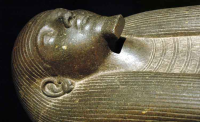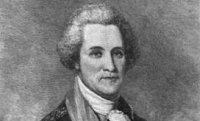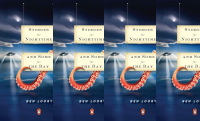by Brian Mihok
General Osgood waded into the water. The beach was crowded. Parents chased after their shouting children. The General went out beyond the floating men and risk-taking adolescents. She had bought a house less than ten minutes away for just this privilege.
The General had no children. Her family tree grew through the limbs of her sister’s choices. Vera had three boys with a man named Anthony. They lived in Connecticut. It was one of the boys’ birthdays soon but the General couldn’t remember which one.
The water was cold and she felt long stringy seaweed under her feet.
The General had been overseeing training exercises in the South Pacific. There were more islands in the Pacific than on any other map, and the military had free use of most of them. The exercises made for long days, long weeks, during which intricate strategic and logistical planning wore everyone down. The General’s organizational and preparational schema were to become standard across all military branches. Her plans emphasized the response to invasion.
Warmongers advised preemptive strikes and the General had little patience for them. She had better arguments and even agreed that invasion was likely, but her advice was to prepare. She won the President’s confidence. He had even given the General a direct order to take three days of leave to mentally and physically refresh herself for her task ahead.
The Pacific water was cold even though the air was hot. Men on shore were eating barbecued chicken and laughing and throwing a spongy ball at each other. The difference between them and soldiers, the General thought, is training. She looked at the children running. They would grow up to attend college or learn a trade or enlist. All three if she were lucky. A girl was flying a kite. Her little brother watched her. Their parents looked to be arguing behind them. The General floated onto her back.
The sky was cloudless. The General let her eyes defocus. Even without clouds there were shapes in the sky. Whispered masses. They looked like nothing, but she was somehow reminded of a coordinate map in a sector of the North Pacific. She tried to think about her nephews but they passed from her mind quickly. She thought of Vera. When they were young Vera was like the little boy watching his sister. It wasn’t until she was in college that she stopped staring at the General as she flew her kite.
They grew up on the upper peninsula of Michigan. Their mother had died when they were young. Their father had a nervous breakdown but somehow they all carried on. She and Vera used to play a game in which they would hide a number of each other’s things around the house. Vera always chose her stuffed animals to be hidden. The General chose the objects she couldn’t live without: her protractor, the fountain pen her mother had given her, a set of antique coins. They realized the game was better if they chose to hide each other’s prized possessions. That way they played until everything was found.
The General always won the game. Sometimes Vera would get frustrated and ask why she always lost. Because I never stop searching, the General told her. You take breaks. You find Daddy instead of your things.
There was water in her ears but still the General heard it. The distant hum of a thousand engines, air being pushed away by long metal blades spinning faster than the speed of sound. The General picked her head up out of the water and looked to the horizon. There was a wide black line that when she squinted split into a row of fast-approaching vehicles.
–
–
Brian Mihok‘s work has appeared in Hobart, Wigleaf, kill author, Bartleby Snopes and elsewhere. He edits matchbook, a journal of indeterminate prose.









